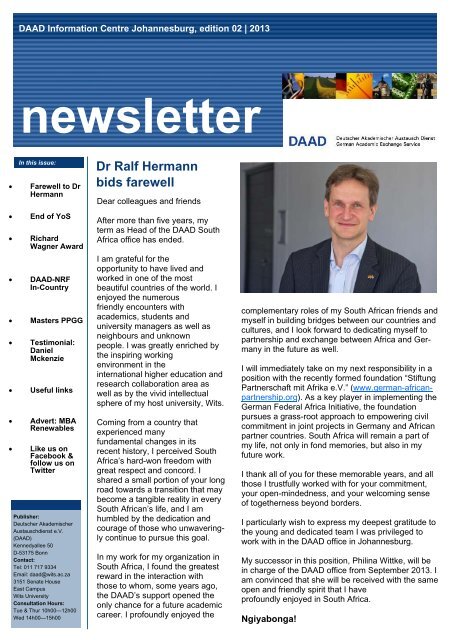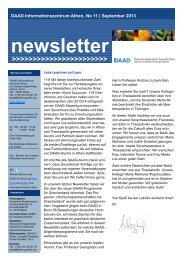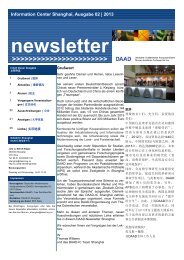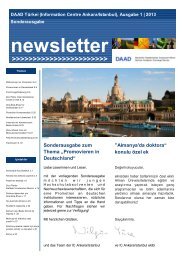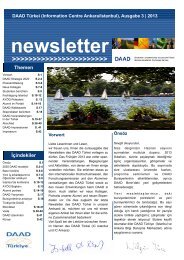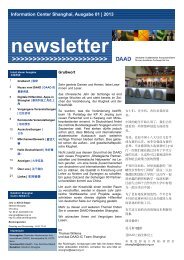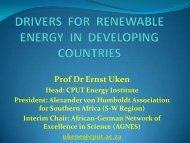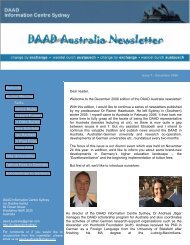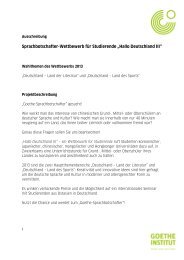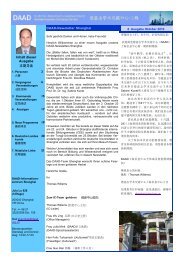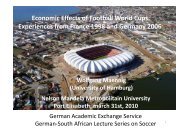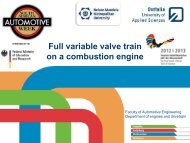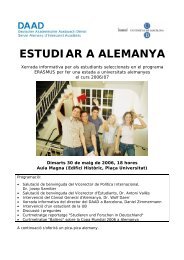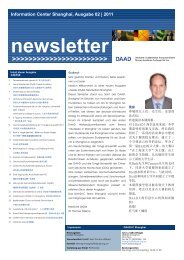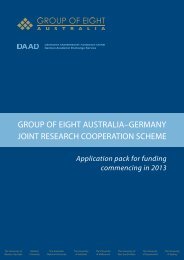IC-Newsletter - DAAD
IC-Newsletter - DAAD
IC-Newsletter - DAAD
Create successful ePaper yourself
Turn your PDF publications into a flip-book with our unique Google optimized e-Paper software.
<strong>DAAD</strong> Information Centre Johannesburg, edition 02 | 2013<br />
newsletter<br />
<br />
<br />
<br />
<br />
<br />
<br />
<br />
<br />
<br />
In this issue:<br />
Farewell to Dr<br />
Hermann<br />
End of YoS<br />
Richard<br />
Wagner Award<br />
<strong>DAAD</strong>-NRF<br />
In-Country<br />
Masters PPGG<br />
Testimonial:<br />
Daniel<br />
Mckenzie<br />
Useful links<br />
Advert: MBA<br />
Renewables<br />
Like us on<br />
Facebook &<br />
follow us on<br />
Twitter<br />
Publisher:<br />
Deutscher Akademischer<br />
Austauschdienst e.V.<br />
(<strong>DAAD</strong>)<br />
Kennedyallee 50<br />
D-53175 Bonn<br />
Contact:<br />
Tel: 011 717 9334<br />
Email: daad@wits.ac.za<br />
3151 Senate House<br />
East Campus<br />
Wits University<br />
Consultation Hours:<br />
Tue & Thur 10h00—12h00<br />
Wed 14h00—15h00<br />
Dr Ralf Hermann<br />
bids farewell<br />
Dear colleagues and friends<br />
After more than five years, my<br />
term as Head of the <strong>DAAD</strong> South<br />
Africa office has ended.<br />
I am grateful for the<br />
opportunity to have lived and<br />
worked in one of the most<br />
beautiful countries of the world. I<br />
enjoyed the numerous<br />
friendly encounters with<br />
academics, students and<br />
university managers as well as<br />
neighbours and unknown<br />
people. I was greatly enriched by<br />
the inspiring working<br />
environment in the<br />
international higher education and<br />
research collaboration area as<br />
well as by the vivid intellectual<br />
sphere of my host university, Wits.<br />
Coming from a country that<br />
experienced many<br />
fundamental changes in its<br />
recent history, I perceived South<br />
Africa’s hard-won freedom with<br />
great respect and concord. I<br />
shared a small portion of your long<br />
road towards a transition that may<br />
become a tangible reality in every<br />
South African’s life, and I am<br />
humbled by the dedication and<br />
courage of those who unwaveringly<br />
continue to pursue this goal.<br />
In my work for my organization in<br />
South Africa, I found the greatest<br />
reward in the interaction with<br />
those to whom, some years ago,<br />
the <strong>DAAD</strong>’s support opened the<br />
only chance for a future academic<br />
career. I profoundly enjoyed the<br />
complementary roles of my South African friends and<br />
myself in building bridges between our countries and<br />
cultures, and I look forward to dedicating myself to<br />
partnership and exchange between Africa and Germany<br />
in the future as well.<br />
I will immediately take on my next responsibility in a<br />
position with the recently formed foundation “Stiftung<br />
Partnerschaft mit Afrika e.V.” (www.german-africanpartnership.org).<br />
As a key player in implementing the<br />
German Federal Africa Initiative, the foundation<br />
pursues a grass-root approach to empowering civil<br />
commitment in joint projects in Germany and African<br />
partner countries. South Africa will remain a part of<br />
my life, not only in fond memories, but also in my<br />
future work.<br />
I thank all of you for these memorable years, and all<br />
those I trustfully worked with for your commitment,<br />
your open-mindedness, and your welcoming sense<br />
of togetherness beyond borders.<br />
I particularly wish to express my deepest gratitude to<br />
the young and dedicated team I was privileged to<br />
work with in the <strong>DAAD</strong> office in Johannesburg.<br />
My successor in this position, Philina Wittke, will be<br />
in charge of the <strong>DAAD</strong> office from September 2013. I<br />
am convinced that she will be received with the same<br />
open and friendly spirit that I have<br />
profoundly enjoyed in South Africa.<br />
Ngiyabonga!
<strong>DAAD</strong> <strong>IC</strong> Johannesburg<br />
newsletter<br />
Close of the German-South African<br />
Year of Science<br />
The German-South African Year of Science ended after exactly 12 months<br />
brimming with research initiatives and public events in both countries. The<br />
event took place at the German Museum of Technology on 16 April in<br />
Berlin.<br />
The science year was closed by the German Federal Minister of Education<br />
and Research, Prof Johanna Wanka and the South African Minister of<br />
Science and Technology, Derek Hanekom. The success of the year has<br />
strengthened the collaborations between South Africa and Germany and<br />
reinforced the slogan of the year ‘Enhancing Science Partnerships for Innovation and Sustainable Development’.<br />
Scientists from both countries were given an opportunity to view their work in an entertaining light through a ‘Science<br />
Slam’ which was moderated by Dr Arnold van Zyl, Rector of Chemnitz University of Technology. The competition was won<br />
by South African Alwyn Bester with his humorous presentation entitled “How to bake a car”.<br />
The <strong>DAAD</strong> film “More than just scholarships” by Trio Media was also presented at the event. The film portrays <strong>DAAD</strong><br />
programmes in South Africa with special reference to the <strong>DAAD</strong>-NRF In-Country scholarship and the stories of the<br />
scholarship holders who have received the award.<br />
The <strong>DAAD</strong> South Africa completed its contribution to the German-South African Year of Science with its Research Lecture<br />
Series on Energy Sciences. The total of 7 lectures saw internationally acclaimed researchers from leading institutes in<br />
both Germany and South Africa present and discuss recent developments in energy technologies and policies.<br />
The German-South African Year of Science 2012/2013 was a joint initiative of the German Federal Ministry of Education<br />
and Research (BMBF) and its South African counterpart, the Department of Science and Technology.<br />
For more on the German-South African Science Year, please visit: www.germansouthafrican-scienceyear.co.za<br />
To view the <strong>DAAD</strong> film “More than just scholarships” visit: https://vimeo.com/63673625<br />
<strong>DAAD</strong> Alumnus Ammiel Bushakevitz wins<br />
the Richard-Wagner Award<br />
Ammiel Bushakevitz received the first Richard-Wagner Award for<br />
upcoming young artists. The prize was conferred at a ceremonial act<br />
in Leipzig on the occasion of the 200th Birthday of Richard Wagner.<br />
Bushakevitz was born in 1986 in Jerusalem, but raised in South<br />
Africa. After his studies at the University Pretoria, he received the<br />
<strong>DAAD</strong> Scholarship for Artists and studied at the University of Music &<br />
Theatre “Felix Mendelssohn Bartholdy” in Leipzig and the Conservatoire<br />
National supérieur de musique in Paris. He performs worldwide<br />
as a soloist, accompanist and chamber musician. As a musicologist<br />
he devotes his activities to Richard Wagner and Franz Schubert.<br />
Photo: Stadt Leipzig/Jens Schlüter
<strong>DAAD</strong> <strong>IC</strong> Johannesburg<br />
newsletter<br />
<strong>DAAD</strong>-NRF IN-COUNTRY MASTERS AND DOCTORAL SCHOLARSHIP PROGRAMME<br />
CALL FOR APPL<strong>IC</strong>ATIONS FOR 2014<br />
The <strong>DAAD</strong> / NRF are pleased to announce the Joint In-Country Scholarship programme for Masters and PhD students<br />
studying at South African universities in 2014.The programme is based on a partnership between <strong>DAAD</strong> and the NRF.<br />
The In-Country Scholarship Programme offers a maximum of 100 new scholarship awards for Masters’ and Doctoral<br />
candidates per annum.<br />
The scholarships are designed for full-time two-year Master’s courses or three-year doctoral degree studies. Please Note:<br />
The initial award is for one year only. For extensions of the award an annual progress report will have to be completed by<br />
the applicant with input from the supervisor of the proposed research and submitted to the NRF via the university financial<br />
aid/ postgraduate/ research office.<br />
Scholarship values are as follows:<br />
Master’s degree : ZAR 60,000.00 p.a.<br />
PhD degree : ZAR 90,000.00 p.a.<br />
Applicants must be South African citizens or hold permanent residence status in South Africa (in the latter case, both<br />
certified proof of university employment and residency must be provided).<br />
The application deadline is the 21 August 2013 for funding for 2014. Applicants must apply online at: https://<br />
nrfsubmission.nrf.ac.za and follow the application procedure set out in the call document. The call for applications can be<br />
found through the link: www.nrf.ac.za/funding_overview.php?fid=190<br />
For further information regarding the programme, please contact daad@wits.ac.za<br />
For technical problems please contact the NRF Support desk: 08:00-13:00 and 13:30-16:30<br />
Email: Supportdesk@nrf.ac.za<br />
Masters Scholarships for Public Policy and Good Governance (PPGG)<br />
This programme is designed to further qualify future leaders in politics, law, economics and administration according to the<br />
principles of Good Governance and to prepare them in a praxis-oriented course for their professional life. The programme<br />
offers very good graduates with a first university degree the chance to obtain a Master’s degree in disciplines that are of<br />
special relevance for the social, political and economic development of their home country. With the knowledge and<br />
experience acquired in Germany the scholarship holders should later contribute to the establishment of democratically<br />
oriented economic and social systems aimed at overcoming social tensions. In addition, the training at German institutions<br />
of higher education should especially qualify the scholarship holders as partners in political and economic cooperation with<br />
Germany. With this programme, <strong>DAAD</strong> intends to contribute to the support of Good Governance and civil society<br />
structures in selected partner countries and regions.<br />
Very well qualified graduates with a first university degree (Bachelor or equivalent) who in the future want to actively<br />
contribute to the social and economic development of their home countries may apply. The scholarships are offered both<br />
for young graduates without professional experience and for mid-career professionals. The scholarships are for Master<br />
courses at a German institution of higher education. The successful candidates will study on one of the selected Master<br />
courses listed below. The courses have an international orientation and are taught in German and/or English.<br />
<strong>DAAD</strong> pays a monthly scholarship rate of currently 750 €. The scholarship also includes contributions to health insurance<br />
in Germany. In addition, <strong>DAAD</strong> grants an appropriate travel allowance as well as a study and research subsidy and in<br />
applicable cases rent subsidies and / or family allowances. <strong>DAAD</strong>-scholarship holders are exempt from tuition fees.<br />
For the full call for applications and the application form, email: daad@wits.ac.za<br />
Application deadline: 31 July 2013 at <strong>DAAD</strong> South Africa (hard copy application).
<strong>DAAD</strong> <strong>IC</strong> Johannesburg<br />
newsletter<br />
A change of seasons: researching in Germany<br />
I arrived expecting spring and received a heavy dose of winter. In fact, on the train ride to Bayreuth I could see snow on<br />
the ground through the window. This was not what I prepared for! Going about one’s day when the temperature is<br />
around zero was a novel experience for a South African such as myself, but fortunately it was not too long until spring<br />
arrived. Watching trees gain more leaves by the day and seeing wild flowers in every patch of grass was another of the<br />
many new experiences I have had in Germany. Arriving in a foreign country not knowing anyone can be quite difficult,<br />
but with the support of the fantastic International Students Office at the University of Bayreuth I soon had my bank account<br />
and cell phone sorted, had made friends (both German and other exchange students) and had learnt how to order<br />
a beer in German.<br />
From careful observation I have discovered that several<br />
stereotypes about the Germans hold true. There is a<br />
certain national fondness for beer, punctuality and wurst<br />
that cannot be denied. It is not at all uncommon to see<br />
students enjoying a casual beer on the lawns of the university<br />
in the afternoon before (presumably) heading off<br />
to lectures, and I discovered the hard way that if you<br />
agree to meet a German at a restaurant at 7pm, and<br />
you arrive at five past 7, you are late! As for the wurst,<br />
well lets just say that every supermarket has a dedicated<br />
wurst section, sometimes half an aisle! Such foibles<br />
aside though, I have found Germans to be friendly,<br />
helpful and welcoming, and always willing to speak<br />
English when they realise you speak little German.<br />
Daniel with other international students at the Bayreuth Volksfest<br />
Arriving in Bayreuth speaking no German resulted in several difficult situations which in hindsight are amusing; such as<br />
trying to describe to a hairdresser what I wanted her to do using only the international language of pointing and gesturing.<br />
This did not go well and I had to wear a hat for the next week until it grew out a bit. German is not an easy language<br />
to learn, especially for English speakers who are not used to distinguishing different genders of nouns, but it is not impossible.<br />
Through a combination of a German course offered by my university, podcasts and a German copy of my favourite<br />
comic (Asterix and Obelix) I have scraped together enough German to hold a basic conversation, order a meal or<br />
ask for directions and I am learning more daily by talking to the German friends I have that are kind enough to talk with<br />
me in German and correct my poor grammar.<br />
“I think that every young<br />
South African would<br />
benefit from spending a<br />
few months living in a<br />
foreign country such as<br />
Germany”<br />
One of the great things about Germany is how easy it is to move about in it. Thus far I<br />
have made weekend trips to Nuremburg, Bamberg and Berlin and am planning trips<br />
to Munich and Prague. The trip that left the greatest impression was my weekend in<br />
Berlin. It really is one of the most dynamic cities in the world and one weekend was<br />
far too short to see it properly. The highlight for me was the Pergamon museum,<br />
where German archeologists have reconstructed an ancient Greek temple from fragments<br />
that they excavated. It is truly awe inspiring. And of course the Berlin nightlife<br />
was not too bad.<br />
Altogether coming to Bayreuth has been a great experience, and I am extremely grateful to <strong>DAAD</strong> for providing me with<br />
this opportunity. I think that every young South African would benefit from spending a few months living in a foreign<br />
country such as Germany; there are many things we can learn from the German way of life. I am also thankful to my<br />
research group (or Lehrstuhl as they say in German) as they have gone out of their way to help me fit in. The standard of<br />
academia here is very high, and through the courses and seminar that I am taking I have learnt a lot of exciting new<br />
mathematics. Furthermore, with the help of my supervising Professor I have been able to conduct research here that I<br />
could not have done in South Africa, and which will form a central part of my masters thesis.<br />
* Daniel Mckenzie is a <strong>DAAD</strong>-NRF In-Country Scholarship holder. He received the short-term research grant available within<br />
the programme to complete a research visit of 4 months at the University of Bayreuth. Daniel is completing his Masters in<br />
Mathematics at the University of Cape Town.
<strong>DAAD</strong> <strong>IC</strong> Johannesburg<br />
newsletter<br />
Green economy offers large variety of job<br />
opportunities<br />
Useful Links<br />
Higher education &<br />
research in Germany:<br />
www.daad.de<br />
www.study-in.de<br />
www.phdgermany.de<br />
www.research-ingermany.de<br />
MBA Renewables qualifies highly skilled professionals<br />
to strengthen the sustainability<br />
business. The next course starting in October<br />
2013 is now open again for applications.<br />
While more and more countries increase the share of renewable<br />
energies in their total energy mix, they also face the challenge<br />
of an always higher pressure to reduce costs of technologies<br />
and applications. It is therefore more important for companies to<br />
apply efficient management strategies and develop innovative business models. This leads to<br />
an increased demand of highly qualified personnel with management skills and know-how of<br />
renewable technologies. The sector offers excellent job opportunities not only for engineers, but<br />
also for graduates of economics, law, political science, natural science and other disciplines.<br />
MBA Renewables, the only Master of Business Administration with a focus on renewable<br />
energies, which can be studied online, offers a broad mix of qualifications needed in<br />
management of renewable energy companies. It focuses on passing on the German experience<br />
to an international audience. MBA Renewables is directed towards international students. Since<br />
its start in 2011, students from all five continents and 30 different countries have registered.<br />
They study online and on a part-time basis alongside their jobs. To facilitate the exchange of<br />
experiences beyond online forums and virtual group-work, part of the course is an on-campus<br />
time of two weeks in Germany after the first study semester.<br />
The study programme is offered by the Berlin based Beuth University of Applied Sciences in<br />
cooperation with Renewables Academy (RENAC).<br />
www.funding-guide.de<br />
www.uni-assist.de<br />
www.academics.de<br />
www.bildungsserver.de<br />
Language, culture and<br />
life in Germany:<br />
www.goethe.de/<br />
johannesburg<br />
Further information: www.mba-renewables.de<br />
Contact:<br />
Ms Silja Krösche<br />
E-Mail: kroesche@beuth-hochschule.de<br />
Tel: 0049-30-45045052<br />
About RENAC:<br />
RENAC is an international provider of education and training specializing in renewable energy<br />
and energy efficiency. In addition to open and in-house training, RENAC offers numerous<br />
services across the whole educational spectrum, such as the establishment of training centers,<br />
train-the-trainer seminars and consulting.<br />
About the Beuth University of Applied Sciences Berlin:<br />
The Beuth University of Applied Sciences Berlin is a state college that offers over 70 accredited<br />
bachelor's and master's degrees in engineering, life sciences and business management for<br />
more than 10,000 students.<br />
www.testdaf.de<br />
www.dw-world.de<br />
www.germanyandafrica.<br />
diplo.de<br />
Like us on Facebook!<br />
<strong>DAAD</strong> South Africa is on Facebook! Simply search for <strong>DAAD</strong> South Africa, where<br />
you can like our page and receive up to date information on the activities<br />
of the <strong>DAAD</strong> in South Africa.<br />
And now follow us on Twitter: https://twitter.com/<strong>DAAD</strong>SouthAfrica<br />
ADVERT<br />
This newsletter was compiled by the <strong>DAAD</strong> Information Centre Johannesburg. If you do not wish to receive future newsletters, please reply to this email and type UNSUBSCRIBE in<br />
the subject line. To change and/ or update your contact details, please send an email to daad@wits.ac.za.


